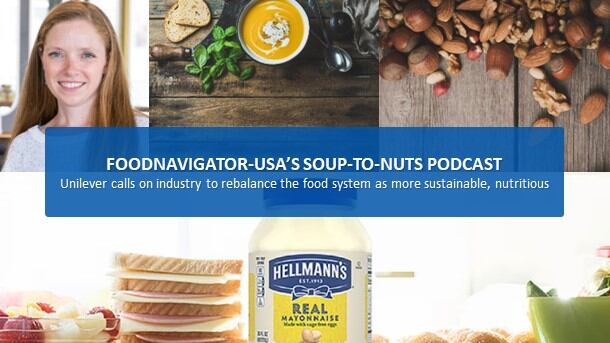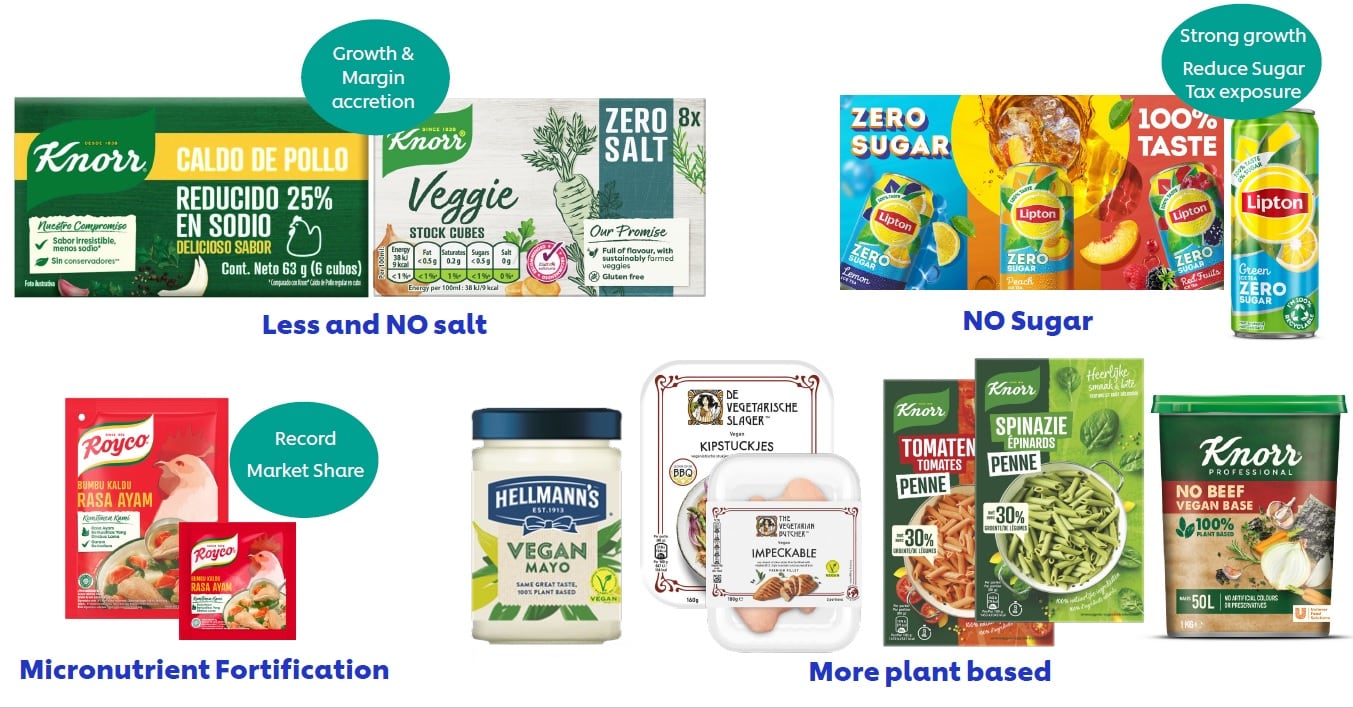To do this, the maker of Hellmann’s and Knorr is embracing a multi-prong strategy to ensure its products are “responsibly delicious” with less sugar, fat and sodium and more plant-based options, and more climate-friendly by reducing food waste, encouraging regenerative farming and selecting more sustainable packaging materials.
In this episode of FoodNavigator-USA’s Soup-To-Nuts podcast, Unilever Nutrition North America General Manager Herrish Patel shares how the company is delivering on its ambitious goals, why they are important and how “being a force for good” benefits not only consumers and the planet but shareholders as well.
[Editor’s note: Never miss an episode of FoodNavigator-USA’s Soup-To-Nuts podcast – subscribe today.]
Promoting positive nutrition
As one of the largest food manufacturers in the world, Patel says, Unilever has a responsibility to help rebalance the food system so that it delivers nutritious food that is healthy for people and the planet and accessible by everyone – which in a time of economic uncertainty means balancing virtues and value.
“We have ... penetration over 50% of US households that we are able to drive messages and drive awareness through our marketing campaigns,” and as such we have “a responsibility to it because it can influence and shape how society thinks about the future,” he said.
With that power comes a responsibility to educate consumers about climate change and nutrition and deliver solutions that are accessible – especially during periods of economic volatility.
“We’re trying to democratize trends [like plant-based eating and regenerative agriculture] with everyday brands, like Hellmann’s and Knorr. … Consumers are looking for alternative solutions, but they have got to be delivered in a way that” is inspiring, such as tapping into pop culture or offering superior products, he said.
He explains that one way Unilever is doing this is through its Future Foods Initiative, which includes a goal to double the number of products that deliver positive nutrition by 2025 and generating €1.5 billion in sales by 2025 from plant-based products in categories that traditionally rely on animal-based ingredients.
For example, Unilever created a vegan version of Hellmann’s mayo that Patel says tastes the same as the traditional egg-based version but has fewer calories, less fat, and less cholesterol. The brand recently launched a vegan Garlic Aioli under the Hellmann’s brand as well.
Unilever is further promoting positive nutrition and the consumption of more plants and less meat through its seasoning, soup and bullion brand Knorr. The brand teamed with the World Wide Fund for Nature to create the Future 50 Foods, which includes foods that people should eat more of because they are better for our health and the planet. It has also teamed with the Food for Climate League to research how to create programs that make healthy, sustainable foods more desirable and accessible.
A fundamental component of Knorr’s work is also on ensuring healthy, nutritious food is also accessible – meaning affordable but also familiar and fun. On this note, Patel said, the company recently teamed with pop star Cardi B to launch Knorr Taste Combos – or recipes that are quick, delicious and affordable.
While a third of Unilever’s portfolio is already plant-based, the company has further invested €85 million to help formulate the next generation of meat- and dairy-alternatives to potentially one day join its line-up.
Other ways that Unilever is improving positive nutrition is by reducing sodium and sugar in its products. As part of its Future Food strategy it aims to ensure 85% of its foods help consumers reduce their intake of sodium to 5g or less per day, and ensure 95% of its ice creams contain no more than 22g of sugar and 250 calories per serving.
Unilever aims to halve food waste and help consumers do the same
Another prong of Unilever’s strategy to be “Boldly Healthier” for people and the planet is to halve food waste in its direct operations from factory to shelf by 2025 and to encourage consumers to reduce how much food they throw away.
Patel shares an example at the consumer level is Hellmann’s Make Taste Not Waste campaign, which is now it its third year, and encourages consumers to use Hellmann’s to turn leftovers into creative new meals.
How can the food industry more quickly and at a larger scale address climate change?
Unilever is further supporting the health of the planet by investing in regenerative agriculture, including a commitment that 50% of its footprint will be regenerative by 2027, including in the US a commitment that both Knorr and Hellmann’s source ingredients from farms using regenerative techniques, including cover crops.
Given the urgency of climate change and the pressure it is placing on the food system, Patel says he worries that the industry as a whole isn’t moving fast enough or at a large enough scale to substantially address the challenges ahead.
“The climate requires solutions quickly. We’d like to think how do we scale faster? How do we work more with governments, NGOs and other players in the industry?” he asked.
The answer likely lies in partnerships, which will require competitors to work together.
“We have to decide as an industry, where do we want to compete and maybe we need to collaborate creatively. So, I think, where we compete is with our brands, our personalitities … what they stand for. That is one area. The second area is how do we compete on innovation?” he said.
But where does the industry need to collaborate, he added. He said one place is on supply chain, which used to be a source of competitive advantage, but now needs to be reimagined for long-term growth.
While Unilever’s goals and Patel’s call to action are substantial investments, Patel stressed they will deliver a return on investment that goes beyond feeling good about doing the right thing.
“Sustainability, purpose and superior performance can coexist. And the reason I end with that is that is why I wake up every day doing what I am doing,” and that is what inspires thousands of people in the US and across the world, he said. He added the work Unilever is doing shows that sustainability can be common place, it can be democratized and it can generate long-term business growth.




